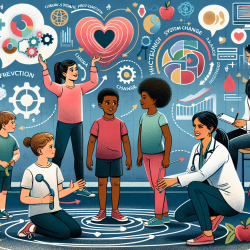As a passionate advocate for children's outcomes and a proponent of data-driven decisions, it is essential to bring to light an often overlooked issue: ageism against younger populations. The recent scoping review titled Scoping Review on Ageism against Younger Populations sheds light on this critical topic, offering valuable insights that practitioners can use to improve their skills and encourage further research.
Understanding Ageism Against Younger Populations
Ageism, typically associated with older adults, is a form of discrimination that can affect any age group, including children and young adults. The review conducted by de la Fuente-Núñez et al. (2021) highlights the inconsistent terminology used to describe ageism against younger populations and underscores the need for a more unified understanding.
Key Findings from the Review
- Terminology: Terms like "youthism," "childism," and "adultism" are used to describe ageism against younger populations. This inconsistency can hinder the development of a coherent body of knowledge.
- Prevalence and Manifestation: Ageism against younger populations manifests in various settings, including employment, health care, and social interactions. Younger individuals often face stereotypes that depict them as impulsive, inexperienced, and less competent.
- Determinants: Factors such as the age, gender, and personality traits of both the respondent and the target can influence ageist behaviors. The review also highlights the role of context and exposure to age-related information.
- Effects: The impact of ageism on younger populations is understudied, but available evidence suggests it can affect mental health, job satisfaction, and overall well-being.
- Interventions: Intergenerational programs and policies aimed at reducing ageism show promise, but more empirical evidence is needed to evaluate their effectiveness.
Implications for Practitioners
For practitioners working with children and young adults, it is crucial to recognize and address ageism in all its forms. Here are some practical steps you can take:
- Educate Yourself and Others: Familiarize yourself with the terminology and manifestations of ageism against younger populations. Share this knowledge with colleagues and stakeholders to raise awareness.
- Promote Intergenerational Programs: Encourage and participate in programs that foster positive interactions between different age groups. These programs can help reduce stereotypes and improve mutual understanding.
- Advocate for Policies: Support and advocate for policies that address ageism in various settings, such as schools, workplaces, and healthcare facilities.
- Conduct Further Research: Engage in or support research that explores the effects of ageism on younger populations and evaluates the effectiveness of interventions.
By implementing these strategies, practitioners can play a vital role in combating ageism and creating better outcomes for children and young adults.
To read the original research paper, please follow this link: Scoping Review on Ageism against Younger Populations.










